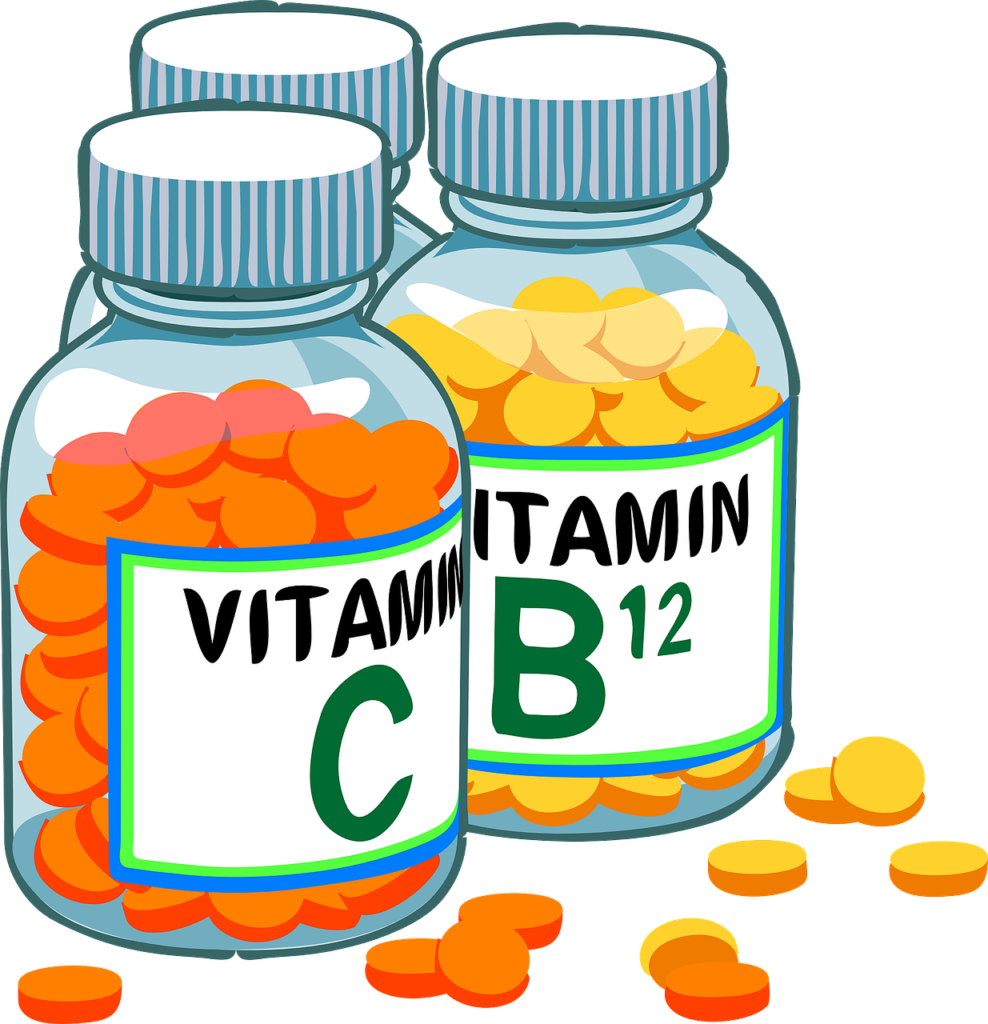In 1911, a Polish researcher named Dr. Casimir Funk proposed the term “vitamines,” derived from “vital amine,” to describe a new food substance that cured beriberi. Over time, the term evolved into “vitamin,” dropping the final ‘e,’ and gained popular favor. Vitamins are organic compounds found in small concentrations in foods, playing crucial roles in the body’s chemistry. They act like electric sparks, powering various bodily functions. Let’s delve into the intriguing realm of vitamins, understanding their significance, types, sources, and therapeutic uses.
1. Understanding the Importance of Vitamins
Vitamins are vital nutrients that our bodies require in small amounts to function optimally. They play specific and essential roles in various bodily processes, from metabolism to immune function and beyond. Without adequate intake of vitamins, we become susceptible to deficiency diseases, impacting our overall health and well-being.

2. Types of Vitamins: Fat Soluble vs. Water Soluble
Vitamins are broadly categorized into two types: fat-soluble and water-soluble. Fat-soluble vitamins, including A, D, E, and K, dissolve in fat and are stored in the body. On the other hand, water-soluble vitamins, such as B complex and vitamin C, dissolve in water and are not stored, requiring daily intake.
3. Vitamin A: The Defender of Health
Vitamin A is renowned for its role in promoting vision, supporting the immune system, and maintaining healthy skin and mucous membranes. It can be found abundantly in foods like liver, dairy products, and colorful fruits and vegetables.
4. The B Complex: Energizing and Essential
B vitamins, including thiamine, riboflavin, niacin, pyridoxine, folic acid, and cobalamin (B12), are crucial for energy production, nerve function, and cell metabolism. They work synergistically to ensure overall well-being.
5. Vitamin C: The Immune Booster
Vitamin C is celebrated for its immune-boosting properties, aiding in collagen production, wound healing, and antioxidant defense. Citrus fruits, berries, and leafy greens are excellent sources of this vitamin.
6. Vitamin D: The Sunshine Vitamin
Vitamin D, often called the sunshine vitamin, is essential for bone health, immune function, and mood regulation. While sunlight is a natural source, it can also be obtained from fortified foods and supplements.
7. Vitamin E: Protector of Cells
Vitamin E acts as a powerful antioxidant, safeguarding cells from damage caused by free radicals. It contributes to heart health, skin integrity, and overall vitality, found in nuts, seeds, and leafy greens.
8. Vitamin K: Blood Clotting and Beyond
Vitamin K plays a crucial role in blood clotting, bone metabolism, and cardiovascular health. Leafy greens, eggs, and dairy products are rich sources of this essential nutrient.
9. Conclusion: Embracing Vitamin-rich Choices
Incorporating a variety of vitamin-rich foods into your diet is essential for maintaining optimal health and preventing deficiency-related ailments. Whether through whole foods or supplements, ensuring adequate vitamin intake is key to supporting your body’s needs.
10 Vitamins for Gum Health and Gum Disease
Periodontal diseases encompass various conditions affecting the gums and supporting structures in the mouth. Gingivitis, the initial stage, involves gum inflammation due to plaque buildup. If left untreated, it can progress to periodontitis, causing irreversible damage to teeth and tissues. Factors like poor oral hygiene, smoking, health conditions, age, and genetics contribute to its development.
Understanding Periodontal Disease
Periodontal diseases affect the gums, jaw bone, and connective tissues in the mouth, impacting many people worldwide. Gingivitis, characterized by inflamed gums, often progresses to periodontitis, a chronic inflammatory condition that can lead to tooth and tissue loss. Factors like poor oral hygiene, smoking, health conditions, age, and genetics increase the risk of periodontal disease. While conventional treatments involve deep cleaning, medications, and sometimes surgery, certain supplements have shown promise in promoting gum health and combating periodontal disease.

2. Vitamin C: Collagen Booster for Healthy Gums
Vitamin C plays a vital role in collagen synthesis, essential for maintaining gum structure and integrity. Deficiency can lead to inflamed, bleeding gums. Studies suggest that adequate vitamin C intake may reduce the risk of gum disease and improve symptoms like bleeding and inflammation.
3. Omega-3s: Anti-inflammatory Powerhouses
Omega-3 fatty acids, particularly DHA and EPA found in fish oil, exhibit potent anti-inflammatory and antibacterial properties. Research indicates that omega-3 supplements can improve measures of periodontal disease, including plaque levels and gum attachment.
4. Probiotics: Balancing Oral Microbiome
Certain probiotic strains like Lactobacillus reuteri possess antimicrobial and anti-inflammatory properties beneficial for gum health. Studies show that probiotic lozenges can reduce pathogenic bacteria associated with periodontal disease and improve treatment outcomes.
5. Melatonin: Sleep Hormone with Gum Benefits
Melatonin, known for its role in regulating sleep-wake cycles, also exhibits anti-inflammatory and antioxidant properties. Research suggests that melatonin supplementation may protect against gum damage by enhancing antioxidant defenses and reducing inflammation.
6. Vitamin D: Sunshine for Gum Health
Vitamin D plays a crucial role in immune function and may help maintain healthy gum tissue and reduce inflammation. While deficiency is common and linked to periodontal disease, further research is needed to determine its therapeutic effects.
7. B Complex Vitamins: Supporting Gum Tissues
Certain B vitamins, including folate and B12, are associated with gum health. Studies indicate that inadequate intake may increase the risk of periodontal disease and gum issues. A B complex supplement can ensure sufficient levels for optimal gum health.
8. Zinc: Mineral Defender of Gum Integrity
Zinc is essential for maintaining healthy gums, and deficiency may increase the risk of periodontal disease. Studies suggest that zinc supplementation can improve gum health, reduce plaque, and alleviate inflammation.
9. Coenzyme Q10: Cellular Guardian for Gums
CoQ10 acts as a potent antioxidant, protecting gum tissues from oxidative stress and inflammation. Research demonstrates that CoQ10 supplementation can reduce gum inflammation and bleeding, supporting periodontal health.
10. Curcumin: Turmeric’s Anti-inflammatory Ally
Curcumin, the active compound in turmeric, boasts anti-inflammatory, antioxidant, and antibacterial properties. Studies suggest that curcumin-based products can inhibit the growth of harmful bacteria, reduce gum inflammation, and improve periodontal health.
11. Green Tea: Oral Health Elixir
Green tea exhibits anti-inflammatory and antibacterial properties beneficial for gum health. While evidence regarding its direct impact on periodontal disease is mixed, incorporating green tea products may contribute to overall oral health.
12. Conclusion: Enhancing Gum Health Naturally
Incorporating vitamins and supplements into your oral care routine can complement traditional treatments and promote gum health. From vitamin C to green tea, these natural remedies offer promising benefits for preventing and managing periodontal disease.

10. FAQs: Answers to Common Questions
Q1. Can I get all the vitamins I need from food alone? Yes, a balanced diet rich in fruits, vegetables, whole grains, and lean proteins can provide most of the vitamins your body requires. However, supplements may be necessary for certain individuals or to address specific deficiencies.
Q2. Are vitamin supplements safe to take daily? When taken as directed, vitamin supplements are generally safe for most people. However, it’s essential to follow recommended dosages and consult with a healthcare professional, especially if you have existing medical conditions or are pregnant.
Q3. Can vitamins cure diseases? While vitamins play vital roles in supporting overall health and may aid in disease prevention, they are not a cure-all for medical conditions. However, therapeutic doses of certain vitamins may complement conventional treatments and support recovery.
Q4. Are there any risks associated with vitamin overdoses? Excessive intake of certain vitamins, particularly fat-soluble ones like A and D, can lead to toxicity symptoms. It’s crucial to avoid megadoses unless prescribed by a healthcare provider to prevent adverse effects.
Q5. How can I ensure I’m getting enough vitamins in my diet? Maintaining a well-balanced diet that includes a variety of nutrient-dense foods is the best way to ensure adequate vitamin intake. If you’re concerned about specific deficiencies, consider consulting a registered dietitian or healthcare professional for personalized guidance.
In conclusion, vitamins are indispensable for overall health and well-being, playing essential roles in various bodily functions. By embracing vitamin-rich foods and making informed choices, you can support your body’s nutritional needs and thrive in life.